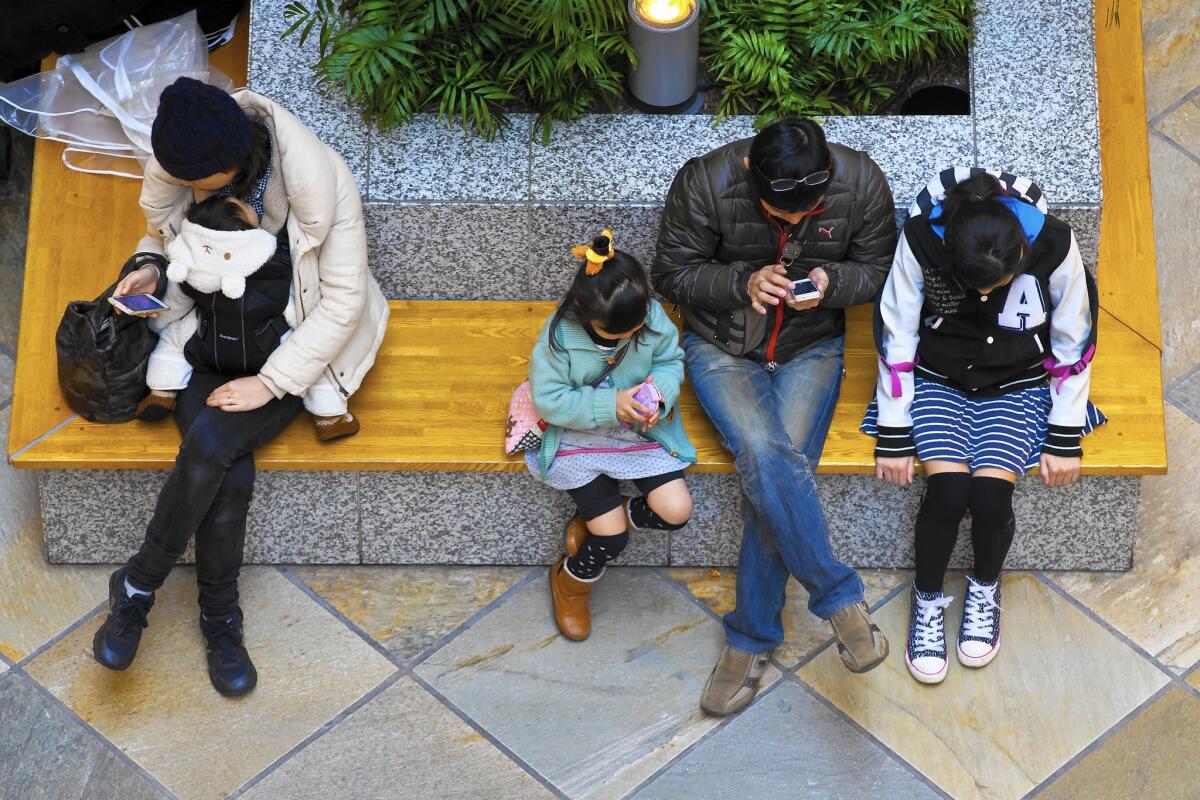When it’s time to clock out on technology

- Share via
A 24/7, Internet-connected reality can feel like running in place, forever busy without accomplishing anything. A blur of personal and professional. But there’s a movement to embrace at least one real day off for your emotional, physical and spiritual well-being.
Some experts share how to connect with yourself and others more deeply.
According to the U.S. Bureau of Labor Statistics American Time Use Survey, on a weekend day, American civilians older than 15 spend 10.11 hours on personal care (sleeping, grooming, health-related activities); 6.46 hours on leisure activities and sports (including three to four hours watching TV); 2.09 hours on household activities; 1.37 hours eating and drinking; 1.27 hours working; .84 hour shopping; .56 hour participating in organizational, civic and religious activities; and .46 hour caring for household members.
But lurking underneath these numbers is the nasty, distracted truth: According to the 2013 Kleiner Perkins Caufield & Byers Internet Trends Report, we check our phones 150 times a day and often watch multiple screens. They reported in 2014 that 84% of cellphone owners use their device while watching TV.
So whether we’re at brunch, binge-watching Netflix, at a concert, hiking Runyon Canyon or spending time with our kids, we’re often in the room but not present.
“People aren’t used to having even a moment with their own thoughts anymore. They immediately just grab their phones or mindlessly check Facebook because they’re bored. They’re also addicted to the dopamine hit they get from receiving texts and checking Twitter,” says Tanya Schevitz, spokeswoman for Reboot, a Jewish nonprofit that seeks to reinvent and reinvigorate Jewish culture for a modern world.
“The goal is to set aside at least one day a week to avoid digital technology, relax, nurture your health, get outside and connect with loved ones,” Schevitz says.
Work, work, work
Some people say they have to be plugged in 24/7 for work, but there are laws requiring time off, says Ethera Clemons, deputy chief of enforcement for California’s Division of Labor Standards Enforcement.
“Workers should have one day off in seven, but there are situations where, say you’re in [movie and TV] production, or the agricultural industry and you’re in a harvest and you have to get this product done before it goes bad, for example, you’re not going to be able to get the one day off in seven,” says Clemons. “But you should get the equivalent.”
Work too many hours and the quality of the work can suffer too. An American Journal of Epidemiology study reports people who worked 55 hours per week showed poorer vocabulary, recall and reasoning than those who worked 40 hours.
“I’m a media entrepreneur. I was working seven days a week and going through a lot of burnout,” says Dan Rollman, chief executive of RecordSetter.com. He came up with a Sabbath Manifesto whose 10 points include avoiding technology and commerce, giving back and getting outside. “The people I work with now know Saturday is a day I’m really not going to work, and ultimately it adds up to me becoming a more productive, happy and balanced person.”
The toll of 24/7
“Our brains and our bodies are designed to take a rest, and they don’t work well if we don’t,” says Dr. David Spiegel, director of Stanford’s Center on Stress and Health. Insomnia, infertility, weight gain, alertness issues, cognitive issues and depression are also linked to lack of sleep and overworking. “And now with 24/7 exposure to light with computers, we are really moving away from our natural cycles, and there is a cost to it,” says Spiegel.
Kids notice
“If you’re with your children and checking your phone all of the time, the message to them is ‘Anyone in the world is more important than you,’” says Schevitz, who talked to children about it. “One kid after another said their parents are on technology all of the time and ignore them when they try to start a conversation. It’s heartbreaking. How are they going to learn to communicate and have real relationships if we aren’t teaching them how?”
Connecting deeply
Orthodox Jews refrain from business transactions, writing, driving, gardening, shopping, laundry and other tasks from sunset Friday to sunset Saturday. “Many people focus on what you can’t do, but it’s really about what you can do,” says Los Angeles Rabbi Naomi Levy. “Embracing the sensual pleasures of life — having a special meal, lighting candles, having conversations where we really listen to others and listen to what our souls are trying to say to us and what God wants from us.”
Whatever the faith tradition — or no tradition at all — people can unplug one day a week as a modern day of rest, Schevitz says.
For the Rev. Ed Bacon, rector of All Saints Episcopal Church in Pasadena, it’s Mondays. And his wife, friends and colleagues hold one another accountable. “You can’t be a human being alone,” he says. “You need community to help you even with issues like having a Sabbath.”






